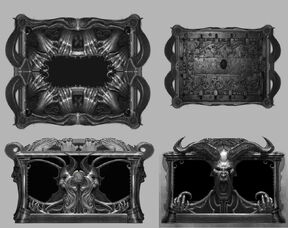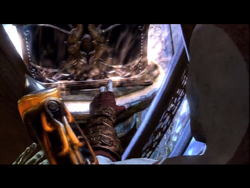"After thousands of years, Pandora's Box was finally opened. The power of the Gods unleashed." - Gaia

Pandora's Box.
Greek Mythology
Pandora's box is an artifact in Greek mythology. The "box" was actually a large jar (πιθος pithos) given to Pandora (Πανδώρα) ("all-gifted"), which contained all the evils of the world. When Pandora opened the jar, the entire contents of the jar were released, but for one – hope. She opened this jar, unleashing all the evils of the universe. She closed the lid on the urn just before hope could escape out of reach. Later she reopened the urn letting hope out. Today, the term "opening Pandora's box" means to create evil that cannot be undone.
In God of War Series
God of War
The Box was created by Hephaestus, by order of Zeus, to contain the evils created by the Titanomachy. Knowing that no mere metal could contain the evil power, Hephaestus forged the box out of a power greater than that of the Gods: the Flame of Olympus. The Flame, as lethal as it was beautiful, would kill all who dared touch it, therefore being the perfect safeguard for the Box. The key to pacifying the Flame was a child Hephaestus created from the flame itself -- Pandora. Knowing that Zeus would take Pandora from him, Hephaestus tricked Zeus into believing that placing the box on the back of the Titan Cronos would be the safest place, thus hereby saving Pandora, but condemning Cronos to a life of agony.
The brilliant architect, Pathos Verdes III, was assigned to build a temple to house the Box, ensuring that none would be able to reach it. Over time, he descended into madness, and the temple's puzzles grew more vicious and complex accordingly. He would eventually commit suicide, leaving the temple somewhat unfinished.
Although many would-be heroes and treasure seekers fell to the traps of Pandora's Temple seeking the Box, only Kratos would claim the powerful artifact in order to destroy Ares. As he found it, however, it was immediately stolen by Harpies as Ares himself slew Kratos. The God of War then raised the box to the heavens, threatening to unleash it on Olympus itself.
However, Kratos returned from the Underworld and reclaimed the Box from Ares. At long last, he opened it and drew from its power, allowing him to meet Ares in battle and eventually destroy him. That would seemingly bring the role of Pandora's Box to an end, but this would not be so.
God of War II
Unbeknownst to Kratos, the opening of the box would have grave consequences on the world. After Pandora's Box was opened, the evils of the Titanomachy escaped and infected the Gods, which caused them to become paranoid and power hungry. Zeus himself fell prey to Fear, causing him to begin his campaign to destroy Kratos.
Fear also motivated Zeus to confront Hephaestus about how Kratos retrieved the Box from the seemingly-unassailable hiding place atop Cronos. Beating the smith god horribly, he learned of Pandora's role as a key to the Flame of Olympus-the true safest place to hide the Box-and began making preparations to move the box and hide Pandora.
Pandora's Box is never really seen or mentioned in God of War II, but its role in corrupting the Gods sets the stage for the game, as fear of Kratos led to Zeus' attempt to kill him, in turn spurring Kratos to seek vengeance on the King of the Gods-and eventually, all of Olympus.
God of War III
Pandora's Box plays a central role in God of War III, where Kratos again seeks it in order to gain power. Along the way, he confronts and destroys most of the infected Olympians, causing the evils within them to be released into the world as disasters. Kratos eventually discovers the Box, placed within the Flame of Olympus, and is told by Athena to seek out Pandora, in order to calm the fires.
Eventually, Kratos succeeds in dispelling the Flame (sacrificing Pandora in the process), but finds the Box to be empty. This revelation only strengthened his rage and desire for vengeance on Zeus, and he eventually struck what seemed to be a fatal blow on the King of the Gods. However, Zeus released a ghost-like projection of himself from his body, which began attacking Kratos by forcing him to feel the fear and pain of his many victims, as well as his own, long-buried guilt over all of the terrible things he had done in his life.
As Zeus' spiritual image attacked Kratos, the Spartan withdrew into his own psyche, guided by the spirit of Pandora. After absolving himself of his sins, he was able to unlock the power Athena had told him to find, symbolized by his astral self opening Pandora's Box, and used it to destroy Zeus for good.
Shortly after Zeus' death, Athena revealed that she placed the "most powerful weapon in the world" in the box-the power of Hope-to counteract the evils in case it was opened again. The first time Kratos opened the box, Athena believed the power of Hope to remain inside, while Kratos drew from the evils. In truth, however, the goddess realized that Kratos had actually accessed Hope, while the evils corrupted the Gods. Until his confrontation with Zeus, Kratos had been unable to use the power, because it was trapped beneath his overwhelming hatred and guilt-but now that it was freed, she could reclaim it and use it to reshape the world. In response, however, Kratos impaled himself on the Blade of Olympus and released Hope to the world, completing the escape of the powers once held in Pandora's Box.
Powers

Though the game states that the only evils born in the Great War and locked in the box were, Fear, Greed, and Hate, more evils could've also been locked in the box.
Cursed
- Anger (Poseidon): Acts and fights Kratos in anger for his crimes, like the destruction of Atlantis.
- Pride (Hermes): Mocks Kratos about his speed.
- Deceit (Helios): Acts proud and later, when defeated, pleads to Kratos to spare his life; and tries to trick Kratos into entering the Flame of Olympus.
- Gluttony/Sloth (Hera): Behaves in a lazy, unenthusiastic way and drinks casually.
- Fear (Zeus): Behaves paranoically, and obsesses over Kratos's death for fear of betrayal.
- Greed (Athena): Tries to usurp the power of Hope.
- Hate (Hades): Hates Kratos in an irrational way, perhaps for having killed his wife, Persephone. This hatred then grows when Kratos kills Hades' niece, Athena, and his brother, Poseidon.
- Lust (Aphrodite): Controlled by carnal desires, she even helps Kratos only for pleasures with him.
- Envy (Hercules): Full of jealousy and resentment for Kratos, and wants to take the title of god of war for himself.
Blessed
- Hope (Kratos): Obtains the power to kill gods.
Trivia
- God of War III: Ultimate Edition was made available in a scaled replica of Pandora's Box.
- Pandora's Box, along with Olympian-forged weapons (such as the Blade of Olympus and the Gauntlet of Zeus), are the only known ways for a mortal to kill a god. Pandora's Box gives whoever opens it the powers to slay a god (along with other abilities, such as increasing their size dramatically).
- It is possible that since Pandora was created to extinguish the flames of Olympus and thus making Pandora's box reachable,that Pandora was almost a "key" not only to the powers inside of it but what the powers do and how to use them, as she explains to Kratos
- Pandora's Box's depiction in God Of War I shows the lid has visages of tormented souls on it. In God Of War III, it was replaced with images of emaciated hands and horned demons.
- In mythology, the gods used the evils of Pandora's Box to punish humanity for Prometheus' crime, creating the first human female - Pandora, and ensuring that she would eventually open the box to bring about Man's downfall. In the game, the Evils are seen as a threat to both humanity and the Olympians, and thus are sealed to never again bring harm to the world; Furthermore, the background story also provided an origin for where the Evils came from - The Titanomachy, unlike the original myths, which never stated where they were created or how they came to be. In an ironic inversion of the original myths, it is a mortal (Kratos) who unleashes the Evils upon the Gods, rather than the other way around.









